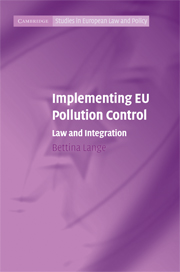Book contents
- Frontmatter
- Contents
- Series editors’ preface
- Acknowledgements
- Update on the IPPC Directive
- Abbreviations
- 1 Introduction
- 2 Traditional perspectives on the role of law in EU integration
- 3 Critical perspectives on the role of law in EU integration
- 4 What is EU ‘law in action’?
- 5 Talking interests – generating procedure: How political discourse constructs key aspects of BAT determinations in BREFs
- 6 Variation in open and closed BAT norms
- 7 What does it cost? Economic discourse in the determination of ‘the best available techniques’ under the IPPC directive
- 8 Does ‘law’ integrate? Licensing German and English coke ovens under the IPPC Directive
- 9 Conclusion
- Appendix: Methodology
- Bibliography
- Index
5 - Talking interests – generating procedure: How political discourse constructs key aspects of BAT determinations in BREFs
Published online by Cambridge University Press: 07 August 2009
- Frontmatter
- Contents
- Series editors’ preface
- Acknowledgements
- Update on the IPPC Directive
- Abbreviations
- 1 Introduction
- 2 Traditional perspectives on the role of law in EU integration
- 3 Critical perspectives on the role of law in EU integration
- 4 What is EU ‘law in action’?
- 5 Talking interests – generating procedure: How political discourse constructs key aspects of BAT determinations in BREFs
- 6 Variation in open and closed BAT norms
- 7 What does it cost? Economic discourse in the determination of ‘the best available techniques’ under the IPPC directive
- 8 Does ‘law’ integrate? Licensing German and English coke ovens under the IPPC Directive
- 9 Conclusion
- Appendix: Methodology
- Bibliography
- Index
Summary
Introduction
Chapter 4 argued that in order to understand more about the nature of law in EU integration it is necessary to analyse ‘EU law in action’. ‘Law in action’ draws attention to the intersections between a ‘social’ and a ‘legal’ sphere because power relations mediate such intersections. They are also a key aspect of BAT determinations. This chapter therefore traces how a political discourse, especially expressions of interests in relation to what constitute ‘the best available techniques’, shape BAT determinations at the first level of the implementation of the IPPC Directive, the drafting of BREF documents for the whole of the EU. BREF writing generates ‘EU law in action’ in various ways. First, the fifth chapter of each BREF lists ‘BAT conclusions’. While these are not legally binding, they have to be taken into account by local permitters when they determine BAT for a specific plant. Second, participants who produce the relevant BREFs make numerous suggestions as to what should be considered as BAT during discussions in the BREF drafting process. Central to the generation of ‘BAT law in action’ is the procedure through which BAT determinations are achieved. This chapter argues that an analysis of a political discourse is key to understanding procedures for determining BAT in the BREFs. It draws attention to the productive nature of power relations by analysing how they construct procedures for determining BAT.
- Type
- Chapter
- Information
- Implementing EU Pollution ControlLaw and Integration, pp. 104 - 141Publisher: Cambridge University PressPrint publication year: 2008



